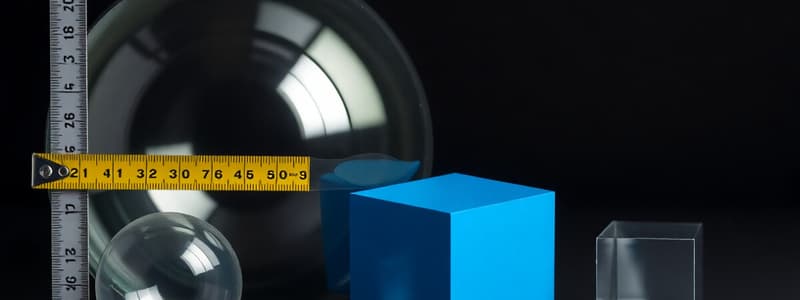Podcast
Questions and Answers
What is the primary difference between mass and weight?
What is the primary difference between mass and weight?
- Mass measures resistance to motion, while weight measures force.
- Mass is the amount of matter in an object, while weight depends on gravity. (correct)
- Mass is location-dependent, whereas weight is constant.
- Mass is measured in liters, while weight is measured in grams.
Which formula correctly represents the volume of a cylinder?
Which formula correctly represents the volume of a cylinder?
- V = 4/3πr³
- V = πr²h (correct)
- V = s³
- V = l × w × h
If an object has a density of 0.8 g/cm³, what will happen when it is placed in water?
If an object has a density of 0.8 g/cm³, what will happen when it is placed in water?
- It will neither float nor sink.
- It will sink because it is denser than water.
- It will partially submerge and come to rest at the bottom.
- It will float because it is less dense than water. (correct)
How would you calculate the volume of a rectangular prism with length 5 cm, width 3 cm, and height 2 cm?
How would you calculate the volume of a rectangular prism with length 5 cm, width 3 cm, and height 2 cm?
Which shape has volume calculated by the formula V = 4/3πr³?
Which shape has volume calculated by the formula V = 4/3πr³?
Which unit is appropriate for measuring volume?
Which unit is appropriate for measuring volume?
If you wanted to determine the density of an object that has a mass of 50 g and occupies a volume of 25 cm³, what would be its density?
If you wanted to determine the density of an object that has a mass of 50 g and occupies a volume of 25 cm³, what would be its density?
How would you convert 2 kilograms to grams?
How would you convert 2 kilograms to grams?
Which of the following statements about shapes is true?
Which of the following statements about shapes is true?
What would happen to the mass of an object if it were moved from Earth to the Moon?
What would happen to the mass of an object if it were moved from Earth to the Moon?
Flashcards
Mass definition
Mass definition
The amount of matter in an object, measured in grams (g) or kilograms (kg).
Mass-location relationship
Mass-location relationship
Mass stays the same no matter where the object is.
Volume definition
Volume definition
Amount of space an object takes up.
Volume units
Volume units
Signup and view all the flashcards
Density formula
Density formula
Signup and view all the flashcards
Density concept
Density concept
Signup and view all the flashcards
2D shape example
2D shape example
Signup and view all the flashcards
3D shape example
3D shape example
Signup and view all the flashcards
Volume of a cube
Volume of a cube
Signup and view all the flashcards
Volume of a rectangular prism
Volume of a rectangular prism
Signup and view all the flashcards
Study Notes
Understanding Mass
- Mass is the amount of matter in an object, measured in grams (g) or kilograms (kg).
- Mass remains constant regardless of location.
- Mass is measured using a balance, not a scale.
Understanding Volume
- Volume is the space an object occupies, measured in cubic units (e.g., cm³).
- Different shapes have different volume formulas.
Volume Formulas
- Cube: Volume = side³
- Rectangular Prism: Volume = length × width × height
- Cylinder: Volume = π × radius² × height
Shapes and Their Properties
- 2D Shapes: Focus on area calculations (e.g., area of rectangle = length × width).
- 3D Shapes: Focus on volume and surface area calculations. Examples include cubes, spheres, and cylinders.
Key 3D Shapes
- Cube: All sides equal, all angles are right angles.
- Sphere: Round shape, no edges or vertices.
- Cylinder: Round bases, straight sides.
Relationship Between Mass and Volume
- Density: The amount of mass in a given volume.
- Density = Mass / Volume
Units and Conversions
- Mass: grams (g) to kilograms (kg) (1 kg = 1000 g)
- Volume: milliliters (mL) to liters (L) (1 L = 1000 mL)
- Cubic centimeters (cm³) equivalent to milliliters (mL)
Real-World Applications
- Density and Buoyancy: Explains why objects float or sink.
- Everyday Use: Volume and mass are crucial in everyday activities like cooking, shipping, etc.
Studying That Suits You
Use AI to generate personalized quizzes and flashcards to suit your learning preferences.




